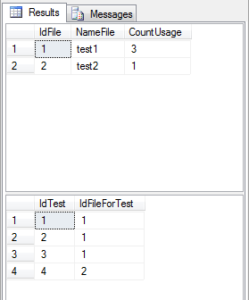I have recently needed to solve the task for my own purpose: to calculate the number of external records linked by a foreign key for each record in a table (File). The task was solved for the specific structure of the File table, but if necessary, the solution can be reworked to a universal one.
I’ll clarify that the solution was developed for an unloaded database, without millions of records and an every minute update, so there was not much concern about the performance.
The main reason was that the number of external links to the File table could change during development and it would be simply unreasonable to constantly rewrite the query. A certain modularity was planned in the system, therefore, all final tables are not exactly known.
The script for creating two labels:
CREATE TABLE [dbo].[File]( [IdFile] [int] IDENTITY(1, 1) NOT NULL, [NameFile] [nvarchar](max) NOT NULL, [CountUsage] [int] NOT NULL, PRIMARY KEY (IdFile) ) SET identity_insert [dbo].[File] ON; INSERT INTO [dbo].[File] ([IdFile], [NameFile],[CountUsage]) VALUES (1, 'test1', 0), (2, 'test2', 1000) SET identity_insert [dbo].[File] OFF; CREATE TABLE [dbo].[TestForFiles]( [IdTest] [int] IDENTITY(1, 1) NOT NULL, [IdFileForTest] [int] NOT NULL, PRIMARY KEY (IdTest) ) ALTER TABLE [dbo].[TestForFiles] WITH CHECK ADD CONSTRAINT [FK_TestForFiles_File] FOREIGN KEY([IdFileForTest]) REFERENCES [dbo].[File] ([IdFile]) ALTER TABLE [dbo].[TestForFiles] CHECK CONSTRAINT [FK_TestForFiles_File] INSERT INTO [dbo].[TestForFiles] ([IdFileForTest]) VALUES (1), (1), (1), (2)
We get the File and TestForFiles tables. The TestForFiles table refers to the File table by the IdFileForTest field.
We obtain the following data set:
The script generates a query to count the number of records in the table:
DECLARE @sql_tables nvarchar(max) = null;
SELECT @sql_tables = CASE WHEN @sql_tables IS NULL THEN '' ELSE @sql_tables + CHAR(13) + CHAR(10) + ' UNION ALL' + CHAR(13) + CHAR(10) END + ' SELECT ' + c.name + ' AS IdFile, count(*) AS FileCount FROM ' + t.name + ' GROUP BY ' + c.name
FROM sys.foreign_key_columns AS fk
INNER JOIN sys.tables AS t ON fk.parent_object_id = t.object_id
INNER JOIN sys.columns AS c ON fk.parent_object_id = c.object_id AND fk.parent_column_id = c.column_id
INNER JOIN sys.columns AS c2 ON fk.referenced_object_id = c2.object_id AND fk.referenced_column_id = c2.column_id
WHERE fk.referenced_object_id = (SELECT object_id FROM sys.tables WHERE name = 'File') AND c2.name = 'IdFile';
IF @sql_tables IS NOT NULL
BEGIN
DECLARE @sql nvarchar(max) = 'UPDATE dbo.[File]' + CHAR(13) + CHAR(10) +
'SET CountUsage = t2.FileCount' + CHAR(13) + CHAR(10) +
'FROM dbo.[File]' + CHAR(13) + CHAR(10) +
'INNER JOIN (' + CHAR(13) + CHAR(10) +
' SELECT IdFile, SUM(FileCount) AS FileCount ' + CHAR(13) + CHAR(10) +
' FROM (' + CHAR(13) + CHAR(10) +
@sql_tables + CHAR(13) + CHAR(10) +
' ) t' + CHAR(13) + CHAR(10) +
' GROUP BY IdFile' + CHAR(13) + CHAR(10) +
') t2 ON t2.IdFile = dbo.[File].IdFile';
print @sql;
EXEC sp_executesql @sql;
END;
The following query is generated:
UPDATE dbo.[File] SET CountUsage = t2.FileCount FROM dbo.[File] INNER JOIN ( SELECT IdFile, SUM(FileCount) AS FileCount FROM ( SELECT IdFileForTest AS IdFile, count(*) AS FileCount FROM TestForFiles GROUP BY IdFileForTest ) t GROUP BY IdFile ) t2 ON t2.IdFile = dbo.[File].IdFile
After the execution, we have such table contents:
Once again, the task was solved for a specific File table, counting works only for cases when there are foreign keys on the IdFile field.
This article was translated by Codingsight team with the permission of the author.
Tags: sql server, t-sql Last modified: September 23, 2021







